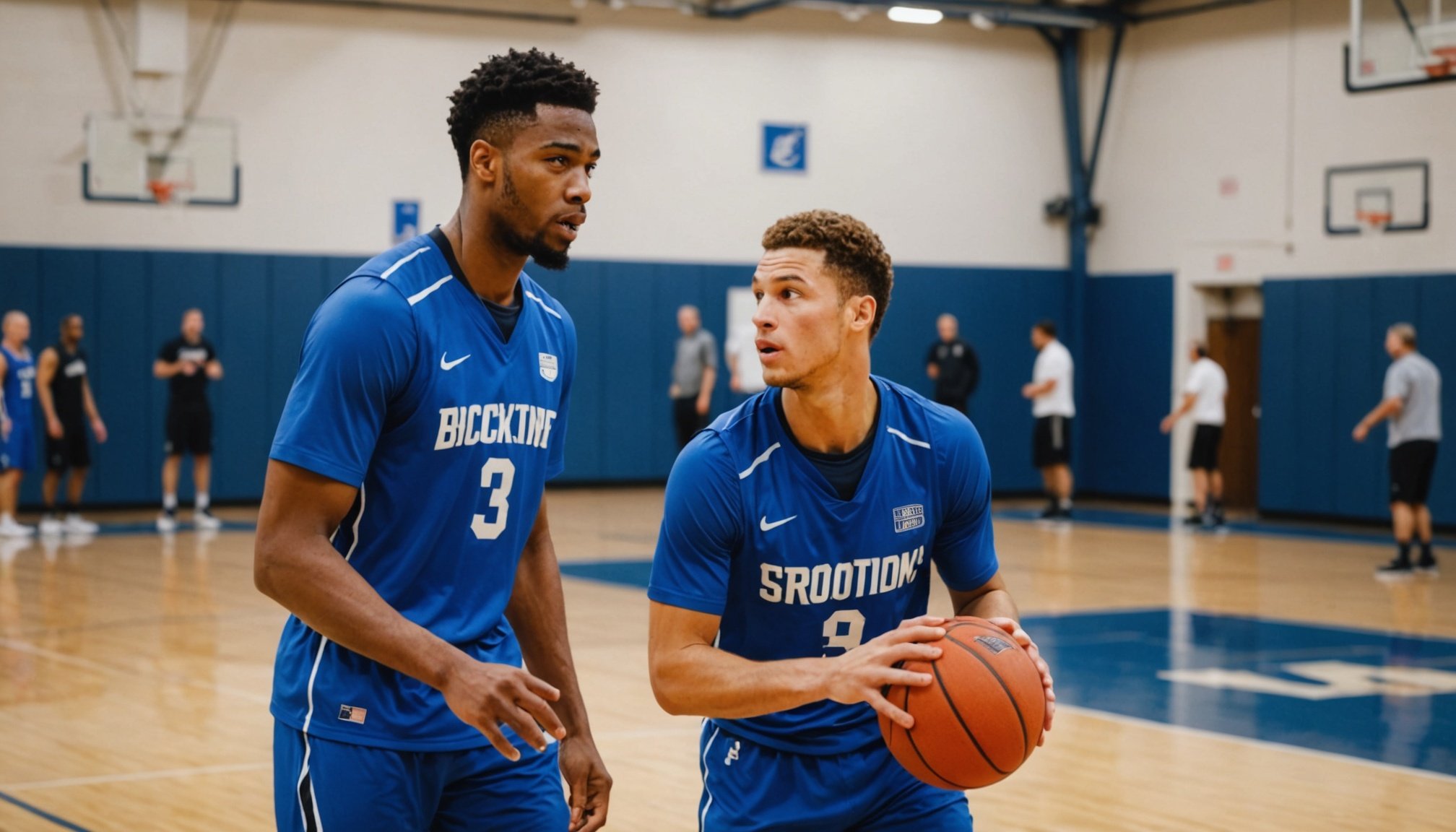Top Recovery Strategies for UK Basketball Players to Combat Mid-Season Fatigue
Understanding the Importance of Recovery in Basketball
Recovery is a crucial aspect of any athletic training program, and for UK basketball players, it is no exception. Mid-season fatigue can be a significant hurdle, impacting performance, increasing the risk of injury, and affecting overall team success. Here’s why recovery strategies are vital:
- Performance Metrics: Effective recovery directly influences speed, strength, and endurance. A well-rested player is more agile, focused, and resilient, which are essential for maintaining high performance levels throughout the season[5].
- Injury Risk: Neglecting recovery can lead to prolonged fatigue and increased injury risk. By prioritizing recovery, players can reduce downtime and enhance their competitive edge[5].
- Mental Well-being: Recovery strategies also impact mental well-being, which is critical for optimal performance. A mentally refreshed athlete is better equipped to handle the stresses of competition.
Hydration and Nutrition: The Foundation of Recovery
Hydration and nutrition are the cornerstone of any recovery strategy. Here’s how UK basketball players can optimize their intake:
Additional reading : Top Exercises to Boost Ankle Stability for UK Basketball Players: Enhance Your Game!
Immediate Post-Exercise Hydration
Rehydrating immediately after a match or intense training session is essential. This helps replenish lost fluids and electrolytes, which are crucial for muscle repair and energy restoration.
Balanced Nutrition
Consuming a balanced meal within two hours of exercise is vital. This meal should include a mix of carbohydrates, proteins, and healthy fats to support muscle repair and energy replenishment.
Additional reading : Boosting Performance: Essential Mental Toughness Exercises for UK Basketball Players Facing Fatigue
Recovery Nutrition Checklist:
- Rehydrate with a sports drink or water within 30 minutes of exercise
- Consume a balanced meal with carbohydrates, proteins, and healthy fats within 2 hours
- Include electrolyte-rich foods or supplements to replace lost electrolytes
- Avoid high-sugar and high-caffeine foods that can dehydrate the body further
Cryotherapy: The Power of Cold Water
Cryotherapy, or the use of cold water, is a popular recovery method among elite athletes, including basketball players.
Ice Baths
Immersing oneself in an ice bath, typically at temperatures between 3 and 15 degrees Celsius, can significantly reduce inflammation and speed up recovery. Athletes often use this method for durations of 10 to 15 minutes to alleviate muscle soreness and promote recuperation[2].
After Drop Phenomenon
It’s important to be aware of the afterdrop phenomenon, where cold blood from peripheral parts returns to the central body area, causing an additional decline in body temperature. Gradually and cautiously raising one’s temperature post-swim is crucial to avoid this condition[2].
Massage Therapy and Active Recovery
Massage therapy and active recovery techniques are also integral to a comprehensive recovery plan.
Massage Therapy
Massage helps in alleviating muscle soreness and improving circulation. Regular massage sessions can be incorporated into the training cycle, either daily or weekly, to enhance recovery and reduce muscle tension[5].
Active Recovery
Engaging in light stretching or yoga post-exercise can help in maintaining flexibility and reducing muscle soreness. Active recovery also includes low-intensity exercise such as cycling or swimming, which can aid in blood circulation and promote overall recovery.
Active Recovery Checklist:
- Light stretching or yoga within 30 minutes of exercise
- Low-intensity cycling or swimming for 20-30 minutes
- Foam rolling or self-myofascial release to reduce muscle tension
- Gentle walking or jogging to maintain blood flow
Sleep Quality: The Unsung Hero of Recovery
Sleep is often overlooked but is a critical component of recovery. Here’s why UK basketball players should prioritize sleep:
Importance of Sleep
Sleep quality directly impacts athletic performance. During sleep, the body repairs and regenerates tissues, builds bone and muscle, and strengthens the immune system. Poor sleep quality can lead to decreased physical performance, increased fatigue, and heightened stress levels.
Tips for Better Sleep
- Consistent Sleep Schedule: Maintain a consistent sleep schedule, even on weekends.
- Sleep Environment: Ensure the sleep environment is dark, quiet, and cool.
- Avoid Stimulants: Avoid caffeine, nicotine, and electronic screens before bedtime.
- Relaxation Techniques: Use relaxation techniques such as deep breathing or meditation to help fall asleep.
Sleep Quality Checklist:
- Aim for 7-9 hours of sleep each night
- Establish a bedtime routine to signal the body for sleep
- Avoid heavy meals close to bedtime
- Limit exposure to screens and electronic devices before bed
Using Metrifit Athlete Monitoring: A Data-Driven Approach
Metrifit Athlete Monitoring is a tool that helps coaches and athletes track recovery markers and adjust training plans accordingly.
Tracking Recovery Markers
Metrifit allows athletes to track physical and mental recovery markers, such as sleep quality, fatigue levels, and muscle soreness. This data can be used to adjust training loads and recovery strategies in real-time.
Adjusting Training Plans
By monitoring progress regularly, coaches can make informed decisions about training intensity and volume. This ensures that athletes are not overtraining and are allowing adequate time for recovery.
Metrifit Athlete Monitoring Checklist:
- Track sleep quality and duration
- Monitor fatigue levels and muscle soreness
- Adjust training plans based on recovery data
- Review recovery plans regularly to ensure they are effective
Case Studies: Successful Recovery Strategies in Elite Teams
Examining case studies from elite teams can provide valuable insights into successful recovery implementation.
New Zealand All Blacks
The New Zealand All Blacks rugby team is a prime example of effective recovery strategies. They prioritize athlete management by integrating advanced recovery technologies and individualized nutrition plans. These strategies have contributed to their sustained success, highlighting the importance of a comprehensive recovery framework[5].
Practical Implementation
- Daily Recovery: Incorporate light stretching, hydration, and active recovery into daily routines.
- Weekly Sessions: Schedule massage therapy, cryotherapy, and other recovery sessions within the training cycle.
- Monthly Review: Adjust recovery plans based on performance metrics and feedback.
Combating Stress and Maintaining Wellness
Stress and wellness are closely linked to recovery. Here’s how UK basketball players can manage stress and maintain overall wellness:
Stress Management
- Mindfulness and Meditation: Use mindfulness and meditation techniques to reduce stress levels.
- Social Support: Maintain strong social support networks to help manage stress.
- Time Management: Ensure adequate time for rest and recovery to avoid burnout.
Wellness Practices
- Regular Health Check-Ups: Schedule regular health check-ups to monitor overall health.
- Healthy Lifestyle Choices: Make healthy lifestyle choices, including a balanced diet and regular exercise.
- Mental Health Support: Seek mental health support if needed, as mental well-being is crucial for athletic performance.
Wellness Checklist:
- Practice mindfulness and meditation regularly
- Maintain a healthy diet and regular exercise routine
- Seek mental health support if needed
- Ensure regular health check-ups
Practical Advice for UK Basketball Players
Here are some practical tips for UK basketball players to combat mid-season fatigue:
Start Early
Begin implementing recovery strategies early in the season to build a strong foundation.
Be Consistent
Consistency is key. Make recovery a part of your daily routine.
Listen to Your Body
Pay attention to your body and adjust your recovery plan accordingly. If you’re feeling fatigued, it may be time to reduce training intensity or increase recovery time.
Seek Professional Help
Consult with coaches, trainers, and medical professionals to tailor your recovery plan to your specific needs.
Recovery is not just an afterthought in athletic training; it is a core component that can significantly impact performance and overall success. By incorporating hydration and nutrition, cryotherapy, massage therapy, active recovery, and prioritizing sleep quality, UK basketball players can combat mid-season fatigue and maintain peak performance levels.
As Dr. David G. Behm, a renowned sports scientist, notes, “Recovery is not just about physical recuperation; it also impacts mental well-being, which is vital for optimal performance metrics”[5].
By adopting these recovery strategies and using tools like Metrifit Athlete Monitoring, UK basketball players can ensure they are always at their best, ready to take on the challenges of the competition season.










